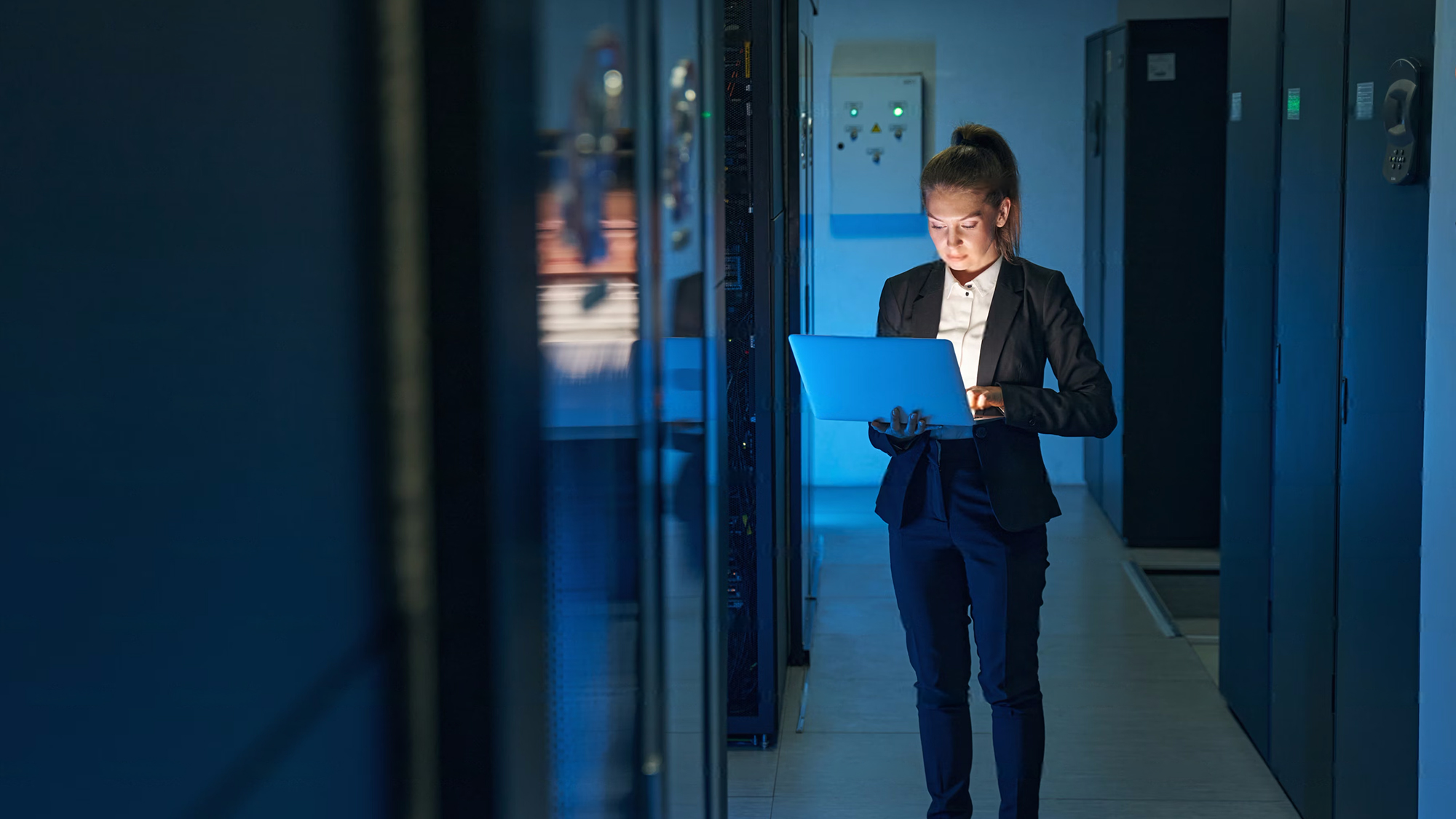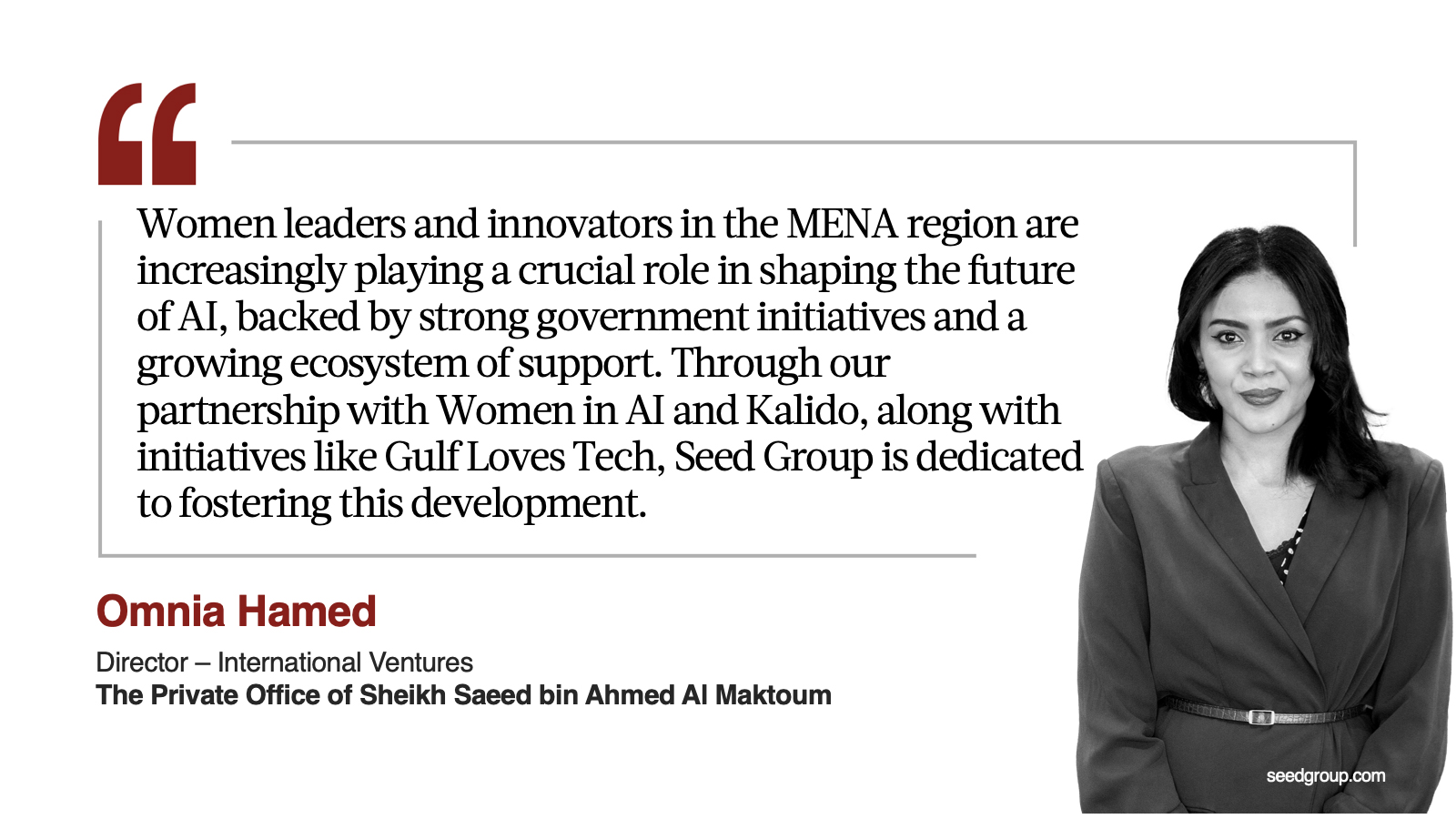



Expert insights from Omnia Hamed, Director for International Ventures at The Private Office of Sheikh Saeed bin Ahmed Al Maktoum and Seed Group
Female entrepreneurs in the MENA region are increasingly leveraging AI to enhance their businesses, according to the 2025 Global Entrepreneurship Survey by GoDaddy. Covering the UAE, Saudi Arabia, and Egypt, the study reveals that more than half of small businesses in MENA are owned by women, with 63% of them founded in the past five years. A good 87% of respondents believe AI will help them compete with larger businesses in the coming year, while 71% predict business expansion within three to five years. These findings emphasise women’s role within the AI domain, advancing productivity and pushing forth innovative practices across various sectors.
This article expounds on the tangible benefits women entrepreneurs gain from utilising advanced AI technologies in their businesses. It focuses on strategies in the UAE that prepare women to effectively incorporate AI into their organisational strategies. Additionally, it sheds light on the ongoing steps at The Private Office of Sheikh Saeed bin Ahmed Al Maktoum and Seed Group to support women in thriving within the region’s competitive tech economy.
As Director for International Ventures at The Private Office of Sheikh Saeed bin Ahmed Al Maktoum, I have spent years working with entrepreneurs, investors, and industry leaders. If there is one thing I have learnt from all those years, it’s this: numbers tell part of the story, but the real impact is felt in the trenches — where businesses are built, challenges are faced, and breakthroughs happen.
Undeniably, improvement is felt throughout the MENA region, but a few prevalent hurdles still exist:
Female-led startups still receive a fraction of venture funding compared to their male counterparts. A good 66% of MENA women entrepreneurs suppose that investors are less keen on backing firms run by women, according to research by Wamda and TiE Dubai.
Women need access to more than just entry-level AI courses. Advanced programs — including practical application, strategy, and monetisation — targeted towards every need of women in AI empower them to take on leadership roles in groundbreaking technologies.
Many AI tools are built on data that lacks diversity, meaning AI solutions might not always serve women-owned businesses effectively. Hence, there’s a real need for technologies that genuinely serve all businesses, including those run by women, to ensure fairness in fields conventionally dominated by men, such as AI.
On the bright side, the UAE is seeing a steady yet gradual increase in progress. An article by Fast Company Middle East noted a 23.1% year-over-year rise in the contributions of females to the corporate sector in 2023. They also conveyed that numerous large UAE corporations pledged to increase women’s hold of leadership positions by 30% this year. For instance, the Al Ghurair Foundation in Dubai hones women’s AI expertise by providing access to global leadership positions and career prospects.
In line with its promise to improve women’s contribution in its AI-powered economy, the UAE is implementing and investing in all-embracing methods to promote female participation in the technology sector. As more Emiratis and expats are encouraged to engage with the country’s knowledge-based, future-focused sectors, structured efforts are being made to address the aforementioned challenges.
A notable example is the Dubai Business Women Council (DBWC), operating under the Dubai Chamber of Commerce, which actively collaborates with private firms to support women in AI-related ventures. The partnerships that the entity has developed have focused on targeted programs aimed at upskilling women and increasing their representation in the technology sector. One such initiative is ‘sAIdaty 2025,’ a collaborative program between DBWC and Oracle.
The sAIdaty 2025 is a strategic endeavour that seeks to upskill 500 UAE women professionals and entrepreneurs in AI. The first phase focused on foundational AI skills, enabling participants to explore AI implementation within their businesses and careers. The upcoming phase will underscore advanced AI applications, entrepreneurship, and digital transformation strategies. Additionally, leadership development remains a core component, instilling confidence and strategic thinking among participants.
Such a government-supported program exemplifies the UAE’s proactive mission to break down the gender barriers in AI and boost their firm’s competitive edge.
Bringing your attention back to GoDaddy’s survey and considering the UAE’s efforts to raise female participation in the corporate field, we find that 36% of women-owned small businesses are utilising the power of AI. AI adoption is proving transformative, with Emirati women saving an average of 14 working hours weekly through automation. They are reinvesting this time into skill development (43%), idea generation (40%), and business strategy (37%). With AI reducing operational burdens, more women are focusing on long-term growth.
Indeed:

It’s essential to note that the Gulf Loves Tech initiative is designed to equip one million women with AI skills, beginning with generative AI courses and mentorship. It connects members to career and entrepreneurial opportunities through Kalido’s AI-driven platform. Backed by The Private Office of Sheikh Saeed bin Ahmed Al Maktoum and Seed Group, this program echoes their commitment to empowering female-led AI businesses with the expertise and tools needed to thrive in MENA.
As we highlight these developments, it’s becoming clear that AI is becoming a catalyst for broader systemic change, particularly when driven by female leadership.
Insights from KPMG’s UAE and Oman Women Leaders’ Outlook further back this claim. They maintained that women leaders in the region are stepping up to mentor the next wave of decision-makers and are bringing in Environmental, Social, and Governance values into their leadership practices. This push is backed by solid national plans like the National Policy for Empowerment of Emirati Women 2031 and the UAE Gender Balance Council Strategy 2026. As a result, female leaders are not just coming up with smart, high-growth solutions but also making sure that technological progress is inclusive and equitable for future generations.
I have been truly fortunate to be surrounded by empowering women, including the incredible leaders at Women in AI, a global nonprofit community that advocates for inclusivity in artificial intelligence. I have learned firsthand from the many AI companies I have had the privilege of meeting. Their insights, resilience, and innovation have shaped my understanding of what it takes to thrive in this rapidly evolving field. As an advocate for intelligence-powered solutions, I view the programs mentioned above, along with several upcoming initiatives, as important steps toward creating a more balanced and technologically empowered corporate sector.
Don’t forget to share this post!
We use cookies to enhance your experience on our website. If you continue using this website, we assume that you agree with these. Learn more.


